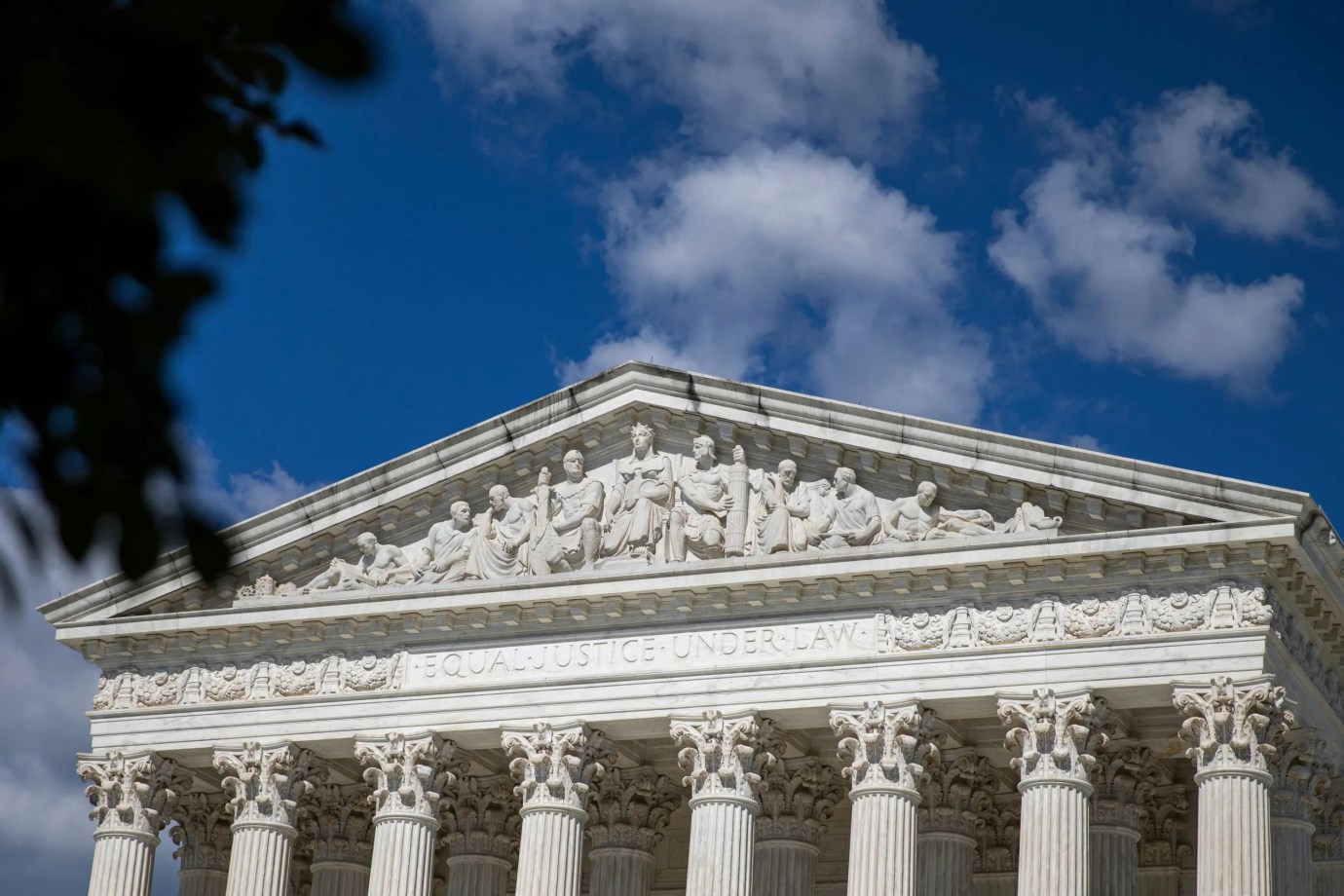I didn’t watch Charlie Kirk’s funeral. With most of the executive branch scheduled to speak, I thought it was destined to be a fash-ier version of Paul Wellstone’s infamous memorial service. Demagogues are always looking for opportunities to demonize their opponents, and a martyred ally’s nationally televised send-off is a hell of an opportunity.
Funerals should comfort the anguished. A political movement whose cardinal rule is that conciliation is for the weak could not rise to that occasion, I believed, and I was right.
Stephen Miller sounded like Stephen Miller. Tucker Carlson told the audience that Jesus was killed by “a bunch of guys eating hummus,” a pungent spin on blame for the crucifixion given his focus lately on Charlie Kirk’s views of Israel. Then the president came onstage and—well, we’ll come back to that.
The funeral was what I thought it would be. Until Erika Kirk spoke, and then it was something else.
“My husband Charlie, he wanted to save young men, just like the one who took his life,” she told the mourners. “On the cross, our savior said, ‘Father, forgive them, for they know not what they do.’ That young man, I forgive him.”
The last place you would look for grace in American public life in 2025 is at a Republican political rally, especially one where the usual lust for ruthlessness has been juiced by wrath and grief. For Mrs. Kirk to muster it in this setting, at this moment, despite the singular anguish with which she’s been burdened, felt almost miraculous even to a non-believer like me.
“The answer to hate is not hate,” she went on. “The answer we know from the gospel is love and always love, love for our enemies and love for those who persecute us.”
Erika Kirk set a stellar moral example yesterday despite immense emotional and political temptation to be vindictive. All but uniquely for a MAGA Republican, her country is better today for her public influence.
Then the president spoke.
The Supreme Court Moves Fast. SCOTUStoday Helps You Keep Up.
SCOTUStoday is your daily briefing from the nation’s leading Supreme Court authority. Every weekday, SCOTUStoday brings SCOTUSblog’s renowned depth and insight directly to your inbox. Whether you’re a legal professional tracking every cert petition or a citizen seeking to understand how the Court shapes American life, SCOTUStoday is set to become an unmissable part of the court watcher’s morning routine.
“He did not hate his opponents. He wanted the best for them,” Donald Trump said of Charlie Kirk, seemingly praising the dead. Then he veered off-script: “That’s where I disagreed with Charlie. I hate my opponents, and I don’t want the best for them. I’m sorry. I am sorry, Erika.”
He joked that maybe she could convince him that hating one’s enemies isn’t right, which turned her moving statement of Christian witness into a set-up for a punch line. The crowd laughed. When it was over, Mrs. Kirk embraced him.
I’ve heard of political “big tents,” but I’ve never heard of one big enough to accommodate two moral systems that aren’t just contradictory but irreconcilable. “Christ’s message, followed by its very antithesis,” philosophy professor Edward Feser wrote of the contrast between Kirk’s and Trump’s remarks. “It’s almost as if the audience is being put to a test.”
It’s been many years since I read the gospels, but I do remember Matthew 6:24: “No one can serve two masters. He will either hate one and love the other, or be devoted to one and despise the other.” That’s the test. Many American Christians, possibly including Erika Kirk, seem to reject the premise.
An eye for an eye.
A few hours before the funeral, the New York Times published an interview with her that ended with Kirk contemplating capital punishment for her husband’s killer. “I told our lawyer, I want the government to decide this,” she said. “I do not want that man’s blood on my ledger. Because when I get to heaven, and Jesus is like: ‘Uh, eye for an eye? Is that how we do it?’ And that keeps me from being in heaven, from being with Charlie?”
In hindsight, that was a preview of her eulogy. Erika Kirk is serious enough in her faith to distinguish its moral demands from the political demands of her tribe and to prioritize the former when the two conflict. That’s not unusual among religious conservatives who’ve grown disaffected with the postliberal GOP and drifted away, but for a prominent Trump ally who’s now a major MAGA figure in her own right, it’s extraordinary.
What struck me about what she said, though, were the words she attributed to her savior. “An eye for an eye” is so repugnant to Christianity as a moral ethos, in Kirk’s view, that those who follow it risk being denied salvation. Jesus himself will hold it against you when you’re judged.
But as it happens, “an eye for an eye” is the president’s favorite Bible verse. And he lives his faith: As Feser explained, Trump believes so deeply in revenge that he’s boasted of ending friendships with people whom he deemed “weak” for declining to retaliate against others who wronged them. Like Erika Kirk did in her eulogy.
His administration was organized around the idea of taking “retribution” on those who cross him, and it’s making good on that promise. The day before Kirk’s funeral, a U.S. attorney in Virginia resigned because the president was set to fire him for not filing bogus criminal charges against a political enemy, New York Attorney General Letitia James. Later Trump posted an open message to Attorney General Pam Bondi on Truth Social hinting that she, too, might be sacked unless she moves quickly to exact a little prosecutorial retribution by charging James, Sen. Adam Schiff, and former FBI Director James Comey with … something.
An eye for an eye is precisely “how we do it” in this government, to borrow Kirk’s phrase. How do she and others justify aligning themselves with that political ethos when it conflicts so sharply with the ethos of their faith?
The pat answer to that will be that one should render unto Caesar what is Caesar’s and unto God what is God’s. We don’t expect our government to turn the other cheek when America is attacked, for example, or to refuse to guard its borders because foreigners are God’s children too. Once you accept the concept of a nation, you’re forced to accept that sustaining it will require the nation’s priorities to diverge from religion’s priorities and therefore that policy will need to diverge somewhat from ethical Christian behavior. The state turning some people away at the border is different from a church turning those same people away at the door.
Diverge—but not directly contradict. Many pro-life conservatives refuse to support Democrats because the left’s permissive political ethos on killing innocent life in the womb conflicts too sharply with their own moral ethos that life is sacred. “Rendering unto Caesar” isn’t an excuse to compartmentalize one’s faith from one’s politics so hermetically that you end up voting for the opposite of your religious convictions.
But that’s what we saw on Sunday in Arizona. Erika Kirk said, “The answer to hate is not hate.” Donald Trump said that it is, at least for him. Kirk evangelized for Christianity. Trump evangelized for what can only be described as anti-Christianity. In fact, I’ve made the case before that Trumpism is less an ideology or an approach to governance than a new (or very old) morality for 21st-century right-wingers. This is from May:
It’s too dependent on the president’s daily whims to be a coherent political program, but its moral vision is clear and consistent: “Strength” is the cardinal virtue and unapologetic ruthlessness in advancing one’s interests is the way in which that virtue is practiced. I wouldn’t equate it with “might makes right” because it expresses no interest in the concept of “right,” only in what might be gained in any situation.
We could summarize it as “Do unto others whatever you think you can get away with doing.” It’s a genuinely Nietzschean, will-to-power rebuttal to conventional Christianity, a bona fide anti-morality that regards empathy as weakness. It resembles a religious cult in its authoritarian demands for absolute loyalty and obedience more so than a political movement.
And there it was, on display at Charlie Kirk’s funeral. The president wasn’t merely incapable of emulating Erika Kirk’s grace, he regarded what she said as so immoral—according to his own anti-morality—that he felt obliged to rebuke it. At a funeral service. For her dead husband.
What on earth is she still doing in his movement? How much rendering unto Caesar are good Christians obliged to do when Caesar is out there every day, by deed and now by word, trying to convince Americans that Christian morality is for suckers?
No one can serve two masters.
Turning point.
But I’m guessing that Erika Kirk will try.
In addition to being a devout believer, a widow, and a mother to two very young children, she’s the new leader of her husband’s group, Turning Point USA. Few conservatives in the United States will have as much political influence as she does in that job, especially over younger adults.
She’s also the most sympathetic Republican in the country and may remain that way for a long time. (How many sympathetic Republicans are there in 2025, really?) Politicians will beg for her endorsement. Right-wing media outlets will scramble to provide her with a platform. And because of the ordeal she’s suffered and the moral authority she established for herself in Sunday’s eulogy, she’ll be free to speak her mind to an unusual degree for a member of Donald Trump’s party. In a party of boorish self-styled “fighters,” no one will want to fight with Erika Kirk.
Which master will she serve in exercising that freedom?
If Republicans lose the midterms next fall and the president bellows that the vote was rigged—and he will—how will Turning Point navigate that moment? Is “thou shalt not bear false witness” the highest priority in that situation, or is it spreading the conspiratorial gospel of Donald Trump?
If news breaks that the president’s immigration czar was caught on tape accepting a bag of money in return for a promise to steer government contracts to shady businessmen, what’s the appropriate takeaway? Is it that stealing is wrong, a Christian moral belief? Or is it “We DO NOT CARE” because one’s political allies should have carte blanche to behave immorally, a Trumpist anti-Christian conviction?
Erika Kirk surprised us (or me, anyway) by serving the better master of the two before her on Sunday. She could do meaningful good for America by using her access to the president to continue in that vein, pushing him in more conciliatory directions. She told the Times that when she spoke to him after Charlie’s death, she said, “My husband just loved conversing with you and using you as a sounding board for all sorts of things. Could we continue that?” Trump agreed. It’ll be good to have a real Christian in his ear.
But as her role in politics becomes less private and more public, she’ll face the same pressure Charlie Kirk did to satisfy a populist audience that wishes to be told, and told and told and told, that its enemies are unforgivable. If she insists on giving them Christian morality when they’re clamoring for Trumpist anti-morality, many will be dissatisfied. Turning Point’s influence might slip. Charlie’s legacy has been betrayed, disgruntled fans might tell her.
So my guess is that she’ll do what most Christians have done since 2015. She’ll compartmentalize ruthlessly. Thou shalt not lie, but it’s fine for Trump to squeal about rigged elections because maybe it’s not a lie? Bribe-taking by public officials is bad, but the “deep state” is worse. We shouldn’t be blowing up foreigners illegally on the off chance that they’re drug dealers, but doing so might at least deter some actual drug dealers. We probably shouldn’t have doomed tens of thousands of impoverished Africans to die by cutting the equivalent of a nickel from the federal budget, but saving money is always nice.
Christian and anti-Christian: You can serve two masters, perhaps, if you don’t think too hard about what each is asking of you. The rise of Christian nationalism proves that Jesus was right, that by trying to serve both you’ll inevitably end up more devoted to one than to the other, but many people have convinced themselves since 2015 that there’s no direct contradiction between Christ’s teachings and a politics that glorifies ruthlessness and tribalism. And the president’s political capital depends on retaining their support.
Erika Kirk may be unusually valuable to him in that regard. Watching them hug on Sunday after he’d repudiated her call for forgiveness seemed to signal that even the most heartfelt Christian believers, fresh from a moment of supreme grace, should feel no qualms about embracing a radically anti-Christian politics. If Mrs. Kirk can separate her fervent moral beliefs from her political loyalties to remain on the team, so can you.
It’s similar to the role that legacy right-wing media has played in the GOP since 2016, providing ideological cover for grassroots Reaganites to stick with the party amid their queasiness about Trump’s agenda. If the president is conservative enough to satisfy most conservative pundits, he should be conservative enough for you. And if he’s moral enough to satisfy Erika Kirk, a person who follows Jesus’ example closely enough to absolve her own husband’s assassin, he’s got to be moral enough for you as well.
Having her on their side to provide that sort of benediction may come in especially handy to the White House as it leans into free-speech crackdowns, abusive prosecutions, historically spectacular graft, and intimidation as the central means of political influence in the United States. Trump’s politics boil down to the proposition that, indeed, no one can serve two masters, and the master that Americans should be serving is him.
It’s a very big tent indeed that can fit Christianity and anti-Christianity. There’s a place of honor reserved inside for Mrs. Kirk if she wants it.


















